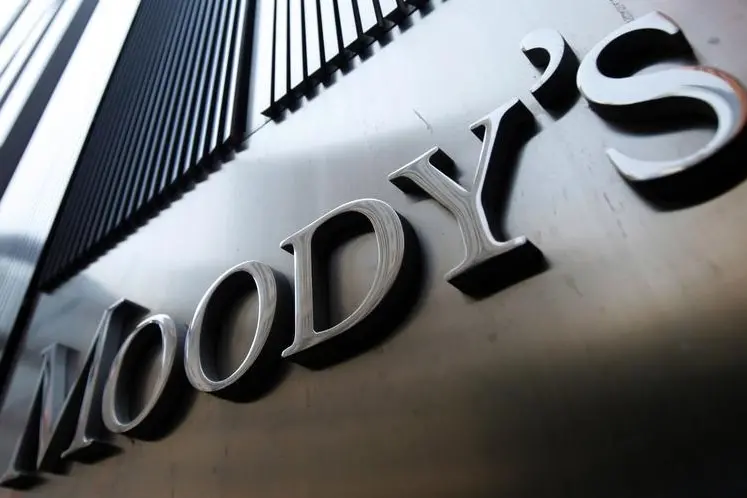PHOTO
11 August 2017
Sean Cronin
London - The planned opening of a Moody’s office in Saudi Arabia has fired the starting gun for the race to build a presence in the country by international financial groups before the biggest IPO in history.
Other financial companies are now also planning to move staff to the country in anticipation of the partial listing of Saudi Aramco and a flood of debt sales and other investment deals tied to the Saudi Vision 2030.
Moody’s this week welcomed a keenly awaited decision by the Saudi financial regulator to grant it a license to operate in the kingdom.
The credit ratings agency now joins Fitch and Standard & Poor’s as the big three companies of the sector jostle for position before an expected flood of debt sales.
“Establishing this commercial presence is a sign of our commitment to participate in the ongoing development of the debt capital market in the Kingdom,” Moody’s said. “Saudi Arabia is an important market for Moody’s and we are committed to maintaining and growing our business in the Kingdom.”
Credit ratings agencies measure the creditworthiness of companies planning to sell debt instruments to investors by administering a rating.
Moody’s said the timeline for opening the office would “be confirmed in due course.”
The increased activity of ratings agencies in Saudi Arabia reflects a shift in corporate lending trends as more companies turn to bonds instead of bank finance.
Standard & Poor’s secured its own license to operate in Saudi Arabia last October and was followed by Fitch, which was approved last April.
It is also a significant step forward in the development of the country’s financial services sector and means more such work will be able to be done in Saudi Arabia instead of in other regional financial hubs such as Dubai and Bahrain.
Saudi Arabia this year raised $9 billion in its first dollar-denominated Islamic bond sale — about $1 billion more than expected.
The government sold a $4.5 billion five-year sukuk tranche at 100 basis points over the mid-swap rate and an equally sized 10-year tranche at a spread of 140 basis points to the benchmark, according to data compiled by Bloomberg.
The bonds generated massive appetite among investors who placed orders worth more than $33 billion.
Sales of government bonds are helping to cover a budget deficit caused by three years of falling prices that led regional oil exporters to turn to debt markets.
HSBC is also planning to add staff to its Saudi Arabian operations.
“The transformation is probably unprecedented in the region and has few historic precedents outside the region for that scale,” the bank’s regional chief Georges Elhedery told Reuters this week.
Other banks planning to take a market share in Saudi Arabia include Citigroup, which obtained an investment banking license in April, and Goldman Sachs, which wants to trade equities.
Sean Cronin
London - The planned opening of a Moody’s office in Saudi Arabia has fired the starting gun for the race to build a presence in the country by international financial groups before the biggest IPO in history.
Other financial companies are now also planning to move staff to the country in anticipation of the partial listing of Saudi Aramco and a flood of debt sales and other investment deals tied to the Saudi Vision 2030.
Moody’s this week welcomed a keenly awaited decision by the Saudi financial regulator to grant it a license to operate in the kingdom.
The credit ratings agency now joins Fitch and Standard & Poor’s as the big three companies of the sector jostle for position before an expected flood of debt sales.
“Establishing this commercial presence is a sign of our commitment to participate in the ongoing development of the debt capital market in the Kingdom,” Moody’s said. “Saudi Arabia is an important market for Moody’s and we are committed to maintaining and growing our business in the Kingdom.”
Credit ratings agencies measure the creditworthiness of companies planning to sell debt instruments to investors by administering a rating.
Moody’s said the timeline for opening the office would “be confirmed in due course.”
The increased activity of ratings agencies in Saudi Arabia reflects a shift in corporate lending trends as more companies turn to bonds instead of bank finance.
Standard & Poor’s secured its own license to operate in Saudi Arabia last October and was followed by Fitch, which was approved last April.
It is also a significant step forward in the development of the country’s financial services sector and means more such work will be able to be done in Saudi Arabia instead of in other regional financial hubs such as Dubai and Bahrain.
Saudi Arabia this year raised $9 billion in its first dollar-denominated Islamic bond sale — about $1 billion more than expected.
The government sold a $4.5 billion five-year sukuk tranche at 100 basis points over the mid-swap rate and an equally sized 10-year tranche at a spread of 140 basis points to the benchmark, according to data compiled by Bloomberg.
The bonds generated massive appetite among investors who placed orders worth more than $33 billion.
Sales of government bonds are helping to cover a budget deficit caused by three years of falling prices that led regional oil exporters to turn to debt markets.
HSBC is also planning to add staff to its Saudi Arabian operations.
“The transformation is probably unprecedented in the region and has few historic precedents outside the region for that scale,” the bank’s regional chief Georges Elhedery told Reuters this week.
Other banks planning to take a market share in Saudi Arabia include Citigroup, which obtained an investment banking license in April, and Goldman Sachs, which wants to trade equities.
© Arab News 2017





















